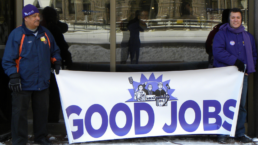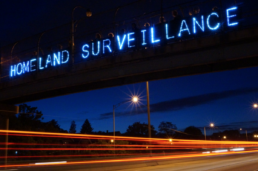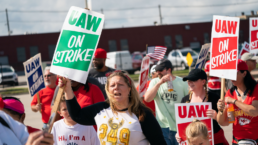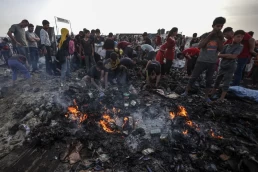A strategic alignment of major networks of unions and community groups in Minnesota have worked together for more than a decade to leverage their collective power.
by Sarah Jaffe, In These Times
Andrea Villanueva was in bargaining five days ago, negotiating a new contract for herself and 500 other retail janitors who clean some of the Twin Cities’ most recognizable stores. A group of building security workers, also members of Villanueva’s union SEIU Local 26, were also in negotiations in the same building. The workers bumped into one another in the hallways as the day went on — stopping to cheer each other on and express their solidarity.
Local 26 is just one of a major network of unions and community groups in Minneapolis and St. Paul that lined up bargaining processes for new contracts — and in some cases, strike votes — around a March 2 deadline, deliberately set in order to maximize their leverage and win collectively-determined community demands around four key issues: dignified work, stable housing, a livable planet and good schools.

That deadline is today, and a rolling Week of Action that will likely include thousands of workers on strike, street protests, and art and theater events, is set to begin.
In this collective effort, Local 26’s 8,000 members are joined by thousands of others: teachers and school support workers, care workers from 12 nursing homes, parks and public service employees, transit drivers, construction workers, restaurant staff, and community groups organizing around housing and climate justice. Before March 2, 15,000 workers had taken strike votes and though some of them have settled, some 10,000 may still walk off the job this week.
Recent Posts
Vermin United: Biden, Trump, BlueLeaks and the Repression of Left Protests
May 29, 2024
Take Action Now The BlueLeaks documents show the feds spying on movement groups from the time of Obama’s presidency through Trump’s. However, under…
The ICC Takes on Israel and the U.S. Congressional Mafia
May 29, 2024
Take Action Now Pro-Israel forces in the US are trying their best to throw sand in the wheels of justice with threats of new sanctions. By Medea…
UAW Challenges Mercedes-Benz Union Vote, Demands New Election Over Alleged Unfair Practices
May 28, 2024
Take Action Now The United Auto Workers union is contesting a recent vote at Mercedes-Benz’s Alabama plant, citing numerous allegations of…
Israel’s Rafah Tents Massacre, Yet Another Heinous War Crime
May 28, 2024
Take Action Now Just when we thought we couldn’t see anything more heinous in its genocidal war on Gaza, Israel has plumbed greater depths of…




